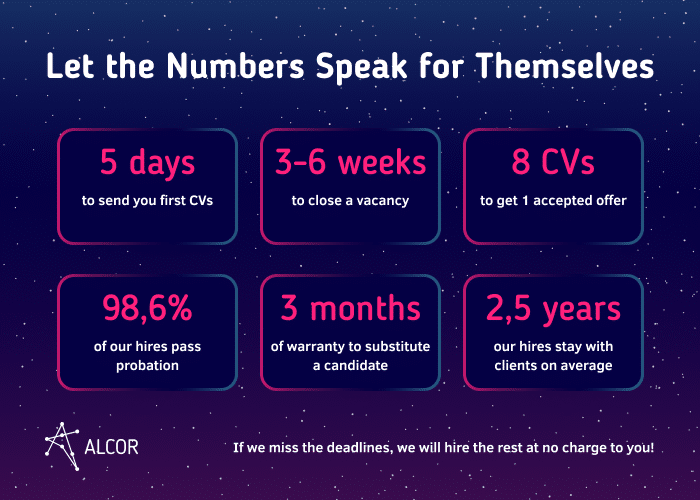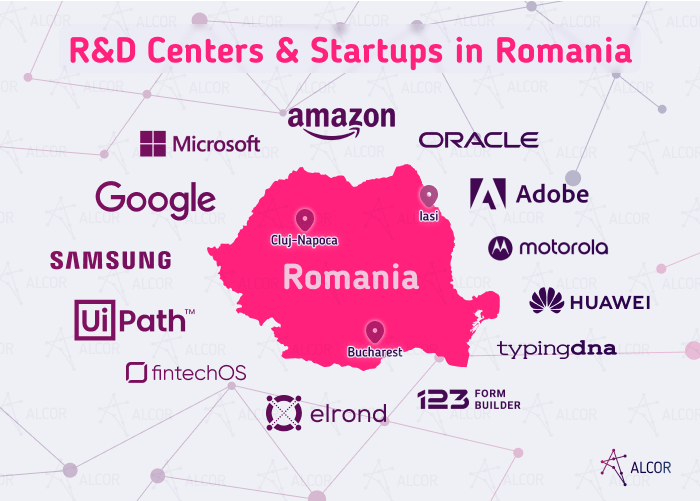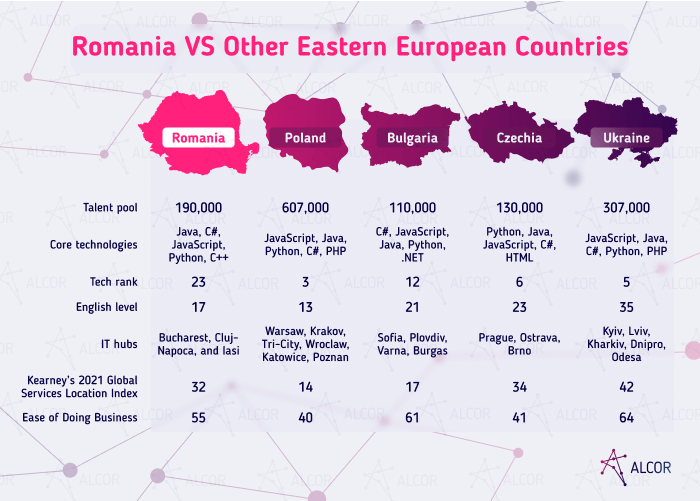Rapid tech sector development and the emergence of high-quality IT talent have brought Romania to the forefront of the Eastern European region and positioned it among the top 20 software development markets in all of Europe. However, the question remains: is this country really worth transferring your product development to?
I’m Sergiy Ovcharenko, CBDO at Alcor. Our expertise lies in aiding Western tech companies in expanding to Romania and other Eastern European destinations. In this article, I am going to dwell upon key aspects of outsourcing in Romania (pros and cons), debunk some myths about its IT market, and compare this location with other offshoring destinations within the EE region. You’ll also receive valuable tips on how to make IT outsourcing to Romania easier and safer. So, let’s get started!

Advantages of IT Outsourcing to Romania
Attractive Price-to-Quality Ratio
The first and foremost thing you will benefit from when outsourcing in Romania is its balanced price-to-quality ratio. As known, low cost does not always equal high-quality services. However, it’s not the case with Romania, as this country offers both qualified IT specialists and cost-effective rates. For instance, the average salary of a middle Blockchain developer in the USA usually ranges from $128K to $150K a year, while in Romania it stays within $60K-$64K. Similarly, American AI engineers of the same expertise level tend to earn $110K-$140K, while their Romanian counterparts get $32K-$40K annually.
This means that if you run a US-based IT company, selecting Romania as an outsourcing destination could lead to a remarkable reduction in expenses — potentially cutting your costs by 2-3 times. Quite impressive, wouldn’t you agree?
Outstanding Tech Expertise
According to the International Trade Administration, Romania boasts the largest number of certified IT specialists in Europe and holds the impressive 6th position globally, with density rates per 1,000 inhabitants (greater than in the USA). If you hire developers in Romania, you’ll get coders that are well-versed in a wide array of technologies. These range from popular languages like Java, JavaScript, C#, and Python to more specialized tools such as React, Angular, HTML, and CSS.
These deep tech qualifications are provided by 5 technical universities and 59 domain-specific educational institutions that bring up almost 7,000 new ICT professionals annually. This is another reason that makes IT outsourcing in Romania appealing to international tech companies.
Blossoming Startup & Business Ecosystem
Even though Romania is one of the youngest Eastern European countries in terms of IT sector development, it’s quickly establishing itself as a dynamic market with a thriving business landscape. The country is home to over 7,930 IT businesses, including about 340 software development companies. The majority of these firms operate in industries like business services, healthcare, financial services, and ecommerce. They deliver custom software development, IT strategic consulting, web development, technical support, information security, and mobile app development.
When it comes to the startup scene, Romania boasts more than 1,500 startup companies, scale-ups, VCs, and PEs, as well as about 100 incubators & accelerators, and 60 rounds of startup investment. Some notable local success stories include UiPath, FintechOS, Elrond, 123FormBuilder, and TypingDNA. No wonder why Romania ranks 41st in the Startup Ecosystem Report 2023.

Ripe IT Hubs
When IT companies outsource software development to Romania, they can choose between three well-developed IT powerhouses, namely Bucharest, Cluj-Napoca, and Iasi. Let’s make an outsourcing location comparison in Romania to see what each of them has to offer.
Bucharest
Holding 63% of software development revenues, Bucharest, stands as a shining star in Romania’s IT market. This dynamic city has etched its name as the 16th largest tech hub across Europe, and a remarkable 4th within the CEE region.
With its robust technological infrastructure, flourishing business landscape, and strategic location, Bucharest secures a spot among the top 20 tech hubs for venture capital investments across Europe, according to Tech Nation. Google, Microsoft, Amazon, Oracle, Dell, and Adobe are just a few examples of tech giants that outsourced software development to Bucharest.
Cluj-Napoca
Often dubbed the “Silicon Valley of Eastern Europe,” Cluj-Napoca is another thriving tech hub in Romania. With developed IT infrastructure and startup ecosystem, Cluj-Napoca has become a buzzing center of innovation. In 2021, its startups attracted over $11.3 million in investment, a sign of its rising appeal to foreign investors. Cluj-Napoca is home to R&D offices of such leading tech enterprises as Microsoft, Accenture, Siemens, Endava, and Emerson.
Iasi
Romania’s second-largest city, Iasi, has undergone an impressive technological transformation. From a post-industrial center, it’s now a booming IT hub with modern offices, tech parks, and infrastructure. Even though it’s not as huge as Bucharest, Iasi is developing in leaps and bounds. Known for its educational opportunities, the city is a hotbed for talented programmers. All of these benefits have attracted leading tech giants like Amazon, Oracle, and Accenture to the local market.
Business-Friendly Climate
What else makes Romania one of the most favorable outsourcing locations is its favorable business conditions. This Eastern European destination has the biggest number of incentives & perks for doing tech business. These incentives include a 0% income tax rate for software engineers and R&D staff, a decade-long 0% income tax rate for R&D companies, and additional deductions for R&D eligible expenses.
Thanks to these incentive programs, the 50 largest tech companies in Romania have quadrupled their businesses and teams during the 2009-2019 period, reaching an overall turnover of over $3+ billion and employing more than 50,000 specialists. This appeal isn’t confined to local IT enterprises; prominent global tech leaders such as Google, Microsoft, Huawei, Samsung, Amazon, Oracle, Motorola, and Adobe have also recognized the advantages and opted to establish their own development teams in Romania.
Convenient Location
One more advantage of going with software outsourcing to Romania is the country’s strategic location. It borders Ukraine, Hungary, and Bulgaria which allows foreign IT companies to easily tap into the neighboring markets’ potential. It takes only 2-4 hours by plane to get to the largest IT centers in Europe, which makes nearshoring to Romania a perfect choice for product businesses.
Debunking Myths about Outsourcing to Romania
-
Stumbling IT sector development
Many IT executives still believe that the Romanian tech sector stands at the beginning of its long journey to becoming a mature and strong participant in the global technology scene. However, this IT industry has been growing at an unprecedented pace during the last 10 years. According to the Romanian Employers Association in the Software Industry (ANIS), the volume of their local IT market is expected to reach $7.4 billion in 2022, meaning it’s going to see a growth rate of 25%. The Romanian ICT sector is seen as the main pillar of the national economy, with its software development services contributing 6.2% of the national GDP. Moreover, the Romanian outsourcing industry is already among the top ones in the world, as it accounts for 5% of the offshore software development market.
-
Insufficient number of tech specialists
Supposedly, a small talent pool is another misconception that stops foreign tech entrepreneurs from choosing this country for outsourcing IT. In reality, Romania boasts about 190,000 tech talents which makes it one of the biggest IT powerhouses in the CEE. Yet, your point about the concentration of software developers in Romanian IT hubs is valid. There are three well-established hubs — Bucharest, Cluj-Napoca, and Iasi — known for their significant clusters of programmers and mature business environments. In addition, two emerging hubs, Timisoara and Sibiu, are also gaining traction.
This fact can make the process of recruiting remote software developers in Romania somewhat challenging. But if you partner with a professional IT recruitment service provider, you won’t have to worry about time-consuming talent acquisition.
-
Poor knowledge of English
What else can make Romania software outsourcing seem risky is its presumably low level of the English language. However, this destination is actually ranked 17th in the EF English Proficiency Index, placed even higher than Hungary and Czechia. Moreover, English is not the only language Romanian developers know. It’s not uncommon for these IT professionals to have a good command of German, French, or Italian, providing easy and effective communication with foreign IT companies. This fact serves as another reason for choosing software development in Romania.
-
Significant cultural gap
And the final myth about Romania outsourcing is substantial cultural dissimilarity. In fact, all Eastern European countries have a close affinity with western culture and business ethics, and Romania is no exception. Let’s assume you decide to scale up your IT business in this destination. In that case, you will get a top-notch software development team in Romania where each member demonstrates exceptional cultural adaptability, open-mindedness, dedication, and a desire to take your product to the next level.
Real Challenges When Outsourcing Software Development to Romania
Employment Contracts & Taxes
For foreign IT companies, selecting the appropriate method of collaboration with Romanian developers can prove to be a complex decision. In essence, there are two main approaches: the Employment and B2B contract.
The employment contract operates in accordance with Romanian Labor Law and encompasses obligatory social contributions (social insurance and health insurance), in addition to a 10% income tax. Nevertheless, there exists a provision through which programmers can get a 10% tax exemption, if fitting the criteria outlined in Romanian law No 1168/2017.
On the other hand, cooperation on B2B terms presupposes Romanian developers to register as sole proprietors, providing IT services to the company. Within this category, there are two distinct types: SRL (Societate cu Răspundere Limitată) and PFA (Personă Fizică Autorizată). Opting for the former entails a mere 1% income tax obligation for programmers. However, it’s essential to note that certain circumstances can escalate this tax to as high as 16%. Conversely, the latter allows developers to pay 10%, accompanied with mandatory social contributions.
Check out our article on taxes for the IT industry in Romania to get a clearer understanding of the system.
Time Zone Difference
Despite Romania’s strategic European location, where it shares only a 1–2-hour time difference with neighboring countries, the scenario changes significantly when it comes to the USA. For instance, the average time difference between Bucharest and New York is 7 hours and with San Jose, CA it reaches 10 hours. It’s all due to different time zones: Romania operates in the UTC+3, while the USA spans different time zones. This can sometimes lead to irregular and abrupt cooperation between the in-house team in the US and offshore developers in Romania.
Nevertheless, with well-organized workflow, proper management tools, and regular meetings, it’s possible to reach productive cooperation between these two teams. Many international tech companies have been benefiting from outsourcing IT to Romania by enjoying round-the-clock business functioning.
IT Outstaffing to Romania
In addition to IT outsourcing, foreign product companies also opt for outstaffing in Romania. This business model works on the basis of talent leasing. When a company requires specific expertise for one-time tasks or projects, they can fill the gaps with outstaffing specialists. For a distinguished period of time these software developers become a part of your in-house team, while still being employed by the vendor. This approach facilitates direct communication and project supervision, aspects that are often not achievable with traditional IT outsourcing.
Nonetheless, there is also a downside to such cooperation. Similar to IT outsourcing, outstaffed teams lack dedication and loyalty since they are not your official employees. Consequently, product quality and data security might be compromised. Hidden fees also pose a potential concern when using outstaffing services. Keep reading this article to explore a more reliable approach to tap into Romania’s IT potential.
Romania vs other Eastern European IT Outsourcing Destinations
As you are now aware of the key aspects of outsourcing in Romania (advantages and disadvantages), it’s time to find out how this destination performs in the Eastern European arena. Let’s do a location comparison.

From the table above we can see that Poland has the largest talent pool in Eastern Europe – 607,000 tech gems. For its part, Romania secures the 3rd position which slightly aligns with the figures for Czechia.
When it comes to coding skills, Romania gives way to all of the countries presented, being ranked 23rd by SkillValue. However, in relation to English proficiency, Romanian software engineers shine as leaders among the Eastern European outsourcing locations, conceding only slightly to Poland. The spotlight on Romania doesn’t dim when it comes to location and doing business rankings either, as it shows good results both among Eastern European destinations and on a global scale.
| Positions | |||||||||||
| Romania | Poland | Bulgaria | Czechia | Ukraine | |||||||
| Full-Stack Software Developer |
$50,000 | $52,000 | $45,000 | $53,000 | $47,000 | ||||||
| Front-End Software Developer |
$42,000 | $44,000 | $38,000 | $40,000 | $40,000 | ||||||
| Back-End Software Developer |
$45,000 | $45,000 | $43,000 | $45,000 | $45,000 | ||||||
| Mobile App Developer |
$37,000 | $37,000 | $35,000 | $33,000 | $35,000 | ||||||
| DevOps Developer |
$52,000 | $52,000 | $42,000 | $45,000 | $42,000 | ||||||
| AI Engineer |
$42,000 | $42,000 | $43,000 | $57,000 | $40,000 | ||||||
| Blockchain Developer |
$56,000 | $56,000 | $55,000 | $60,000 | $58,000 | ||||||
| Software Development Engineer in Test |
$30,000 | $30,000 | $33,000 | $38,000 | $30,000 | ||||||
Developer salaries were converted to US dollars at a relevant exchange rate for August 2023. |
|||||||||||
In terms of the annual developer costs compared, the price tag for Romanian developers is slightly lower than in Poland. To illustrate, consider the median salary of a mobile app developer. In Poland, it stands at approximately $48,000 annually, while in Romania, it totals about $37,000 per year.
In conclusion, Romania emerges as a competitive IT destination that has limitless potential. The allure lies in its ability to provide top-notch work at a reasonable price point. Therefore, opting for Romanian outsourcing is not a bad but instead winning option for your tech business.
IT Services to Outsource in Romania
If you have already decided to opt for Romania, consider the following 3 outsourcing services:
1. Business Process Outsourcing (BPO)
Outsourcing business-related processes is a widely used practice among IT companies that embark on offshoring. It allows them to hand over secondary activities to a local third-party vendor while focusing on product development. You can choose from a wide variety of back-office services, including tech recruitment, HR management, employer branding, payroll & accounting outsourcing, legal compliance, and procurement of equipment. It’s not rare to see front-office operations (marketing, software development, customer support, etc.) among the BPO services. However, if you are an owner of a product company, it’s better to refrain from their delegation since it’s the core of your business.
2. Software Development Outsourcing
With more than 300 IT outsourcing providers in Romania, foreign companies have a range of services at their fingertips. While IT outsourcing is a popular strategy, it’s important to recognize its potential risks and drawbacks. When partnering with a tech outsourcing provider, product tech companies may encounter issues like cloudy pricing, potential data leaks, reduced control over software development, and even difficulties in securing additional investor funding. Therefore, to keep your essential activities in-house, consider setting up your own engineering team in Romania.
3. IT Recruitment Outsourcing
For those IT companies that want to feel all the advantages of offshoring software development in Romania, this option comes in handy. Cooperation with a competent IT recruitment company will enable you to get only seasoned engineers in the team, set competitive annual remunerations and attractive EVP, receive full coverage of the hiring processes, and get in-depth consultations on the local tech market.
This was the path chosen by US-based IT company Dotmatics when expanding into Eastern Europe. Through cooperation with our company Alcor BPO, Dotmatics not only achieved expense reduction but also successfully formed a top-tier team of over 30 software developers within a year! Notably, several critical positions, including Product Manager and QA Engineer, were promptly filled with qualified candidates, further enhancing the partnership’s effectiveness.
Tips to Make Outsourcing to Romania Easier
-
Identify the tasks for delegation
Before you consider outsourcing, it’s important to know which tasks or projects you want an IT outsourcing provider to handle. If your business isn’t in the tech industry and you have one-time tasks, you can easily pass it to an outsourcing provider. They’ll take care of everything from start to finish, liberating you from hassles associated with IT recruitment and project management. However, if you run a tech product company and need help with software development, traditional outsourcing might come with risks. In this case, think about using Recruitment Process Outsourcing (RPO) to get your own team of developers.
-
Choose a suitable cooperation model
The next step is to learn about the different engagement models. Basically, there are 4 of them:
- Fixed Price: You set the project’s requirements, budget, and timelines in advance. This reduces the chances of unexpected costs, but it’s not very flexible, which can hinder project progress.
- Time & Material: You pay for the actual hours spent on the project. However, without clear planning and timeframes, you might end up spending more than expected.
- Dedicated Team: This is quite a flexible model which allows changes throughout the project. But remember, you won’t get your own team of developers with this model, which could impact product quality.
- Offshore Development Center: This is great for tech companies. You can build a loyal team of developers in a more cost-effective location. It’s safer than traditional outsourcing, but you’ll need to handle back-office tasks like recruitment, accounting, and legal matters. Consider partnering with a reliable partner to help you set up the offshore development center.
-
Find a reliable provider
When choosing a service provider, make sure they possess expertise of the local market, a strong track record, outlined guarantees, and positive reviews on independent resources. It’s vital to remember that a good vendor should be interested in your business success, providing the most efficient methods of smoothing out your outsourcing journey.
Consider Alcor BPO as Your Reliable IT Recruitment Partner in Romania
If you want to feel all the benefits of the Romanian outsourcing destination, consider partnering with our company Alcor. We provide IT recruitment services in Romania, Poland, Ukraine, and other Eastern European countries. Our solution also includes operational support, such as payroll, legal compliance, procurement management, and can be upgraded to an R&D office. Such foreign tech businesses like Gotransverse, ChromaWay, and Insightsotware have successfully expanded to Romania with our comprehensive support.
Here are a few compelling reasons for choosing Alcor as your trusted partner:
- 10+ years of experience in the Eastern European IT market (with a particular focus on providing IT recruitment services in Romania, Poland, and Ukraine).
- Specialization in hiring middle, senior, and C-level IT specialists for American and European product companies;
- 40+ IT recruiters and researchers on board with an access to 600,000 candidate network.
- Relevant resumes only: maximum of 8 CVs to get to 1 accepted offer;
- High-quality hires: 4 out of 5 candidates that we introduce to our clients are invited for an interview, while 98% of them successfully pass the probation period.
- Transparency in pricing: we provide detailed invoices for our services which you keep under control and can change any time, plus no buy-out fees as the tech team is yours from the very beginning.
- Outlined guarantees: we vouch for the quality of our services, providing our clients with a 3-month warranty for each hired candidate.
FAQ
1. What are the advantages of outsourcing in Romania?
There are multiple reasons for choosing Romania as an outsourcing destination: balanced price-to-quality ratio, huge talent pool, high English proficiency, business-friendly climate, and convenient location. Read this article to learn more about the advantages of outsourcing in Romania.
2. Where should I hire software developers in Romania?
Romania boasts 3 developed IT centers (Bucharest, Cluj-Napoca, and Iasi) and 2 emerging ones (Timisoara and Sibiu). The biggest concentration of software engineers is in Bucharest, as it is the ripest IT hub in the country.
3. Which companies do outsourcing in Romania?
The most popular outsourcing companies in Romania are 1) BPO, 2) software outsourcing, and 3) IT recruitment outsourcing. The first one mostly specializes in back-office operations; the second provides everything from web-page development, software testing to security services, consulting, and support; and the third one builds teams of Romanian developers.
4. Would it be easy to find an outsourcing vendor in Romania?
It shouldn’t be difficult to select an IT outsourcing provider out of 280 available vendors in Romania, yet if you are a product tech company, it’s better to choose a more cost-effective and verified option: your own engineering team.
